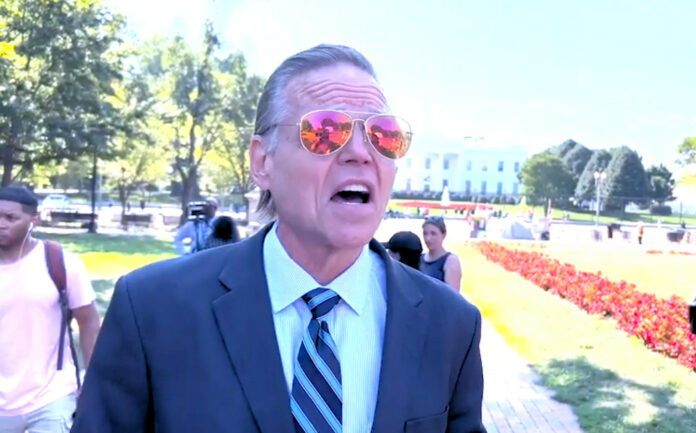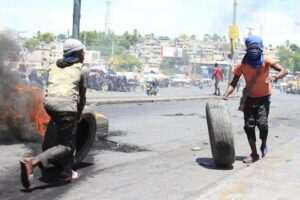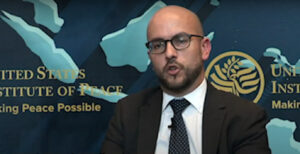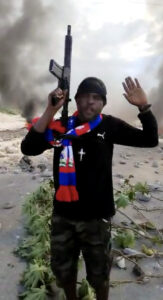
(Français)
On Sep. 19, activists gathered outside the White House to commemorate one year since the mass deportation of Haitian asylum seekers in Del Rio, Texas.
The commemoration came as a popular uprising in Haiti entered its third week, sparked by International Monetary Fund-imposed fuel price hikes amid spiraling inflation and a state of total insecurity.
“We will have to readjust the price of gas,” Interim Prime Minister Ariel Henry told Haitians in a televised speech on Sep. 11, seeking to avoid blame. “I know there are people who will try to heat up your heads, tell you to take to the streets so that gas does not come back to its normal price… Violence has no place. Violence won’t get us anywhere. I put out a call for calm to everyone.”
The U.S. and its junior partners, however, have sought to shift blame for the unrest onto local economic interests and so-called “gangs.”
On Sep. 21, U.S. President Joe Biden told the United Nations General Assembly (UNGA): “We continue to stand with our neighbor in Haiti as it faces political-fueled gang violence, and an enormous human crisis, and we call on the world to do the same,” adding that, “we have more to do.”
“If you look at the protests that are taking place as a result of the end of fuel subsidies, they are financed by economic actors,” top Biden advisor and National Security Council Director Juan Gonzales commented.
In attendance at the White House protest was former U.S. Special Envoy for Haiti Daniel Foote, who warned that if Washington does not train a Haitian National Police unit to crush Haiti’s so-called “gangs,” it will launch a full scale invasion.
“The U.S. has two choices: either reinforce the police now, probably using military trainers, so send a company of special forces trainers to teach the police and set up an anti-gang task force, or send 25,000 troops at some undetermined but imminent period in the future,” Foote declared.
Foote resigned from his post in September 2021, citing the inhumane treatment of Haitians at the border as the breaking point.
“I realized I could no longer have the positive impact and push Haiti towards where it needs to go in my role as special envoy because of the guy in that building right there,” he told the crowd, pointing at the White House.
The resignation earned him praise from prominent intellectuals including filmmaker Raoul Peck, who called Foote’s congressional testimony “shattering and redemptive,” saying that it “restored some measure of honor to decades of shameless American intervention.”
Since his resignation, Foote has been vocally opposed to continued U.S. support for Haitian Interim Prime Minister Ariel Henry, who remains in office despite being implicated in the July 2021 assassination of President Jovenel Moïse.
Rather than withdrawing support for Henry, Washington has sought to unite him with his principal rival, a coalition of traditional political parties and dozens of so-called civil society groups, known as the Montana Accord.

Described as a “Haitian-led” alternative to Henry, the Montana coalition proposes a two-year transitional government leading to elections.
This Accord is headed by Magali Comeau Denis, who, like Ariel Henry, was a key figure in the 2004 U.S.-orchestrated coup d’état against President Jean-Bertrand Aristide as well as Culture Minister of the de facto regime set up after the ouster.
So far, the Biden administration’s attempts to unite the two coalitions have proven unsuccessful.
Despite Henry’s ongoing premiership, the Montana Accord is increasingly favored by Washington, with Assistant Secretary of State for Western Hemisphere Affairs Brian Nichols publicly endorsing it.
As the uprising has rocked Henry’s government, the U.S. establishment’s flagship foreign policy think tank, The Council on Foreign Relations (CFR), published a strategy paper endorsing the Montana Accord as “the most credible Haitian plan on the table,” saying “the United States should still help Haitians initiate its implementation.”
Early in 2022, as the Biden administration pressured the Montana group to compromise with Ariel Henry, the accord fractured.
The Movement of Haitian Liberty and Equality for Fraternity (MOLEGHAF) pulled out, accusing Montana of partaking in “an international plot” and saying “we’re not going to facilitate the work of the imperialists.”
The Lavalas Family party of former President Aristide quietly followed suit.
As these members have broken off, Foote and the liberal establishment have promoted the accord as the ideal partner for the United States and its institutions.
“They need somebody whom the international community, the IMF, the donors, can trust and work with and the Haitian people can trust and work with to improve their lives and move towards choosing their own leaders,” he explained.
“Train the police… or we’re going to have to send 25,000 troops in a combat stabilization mission,… but there’s no sustainability there whatsoever,” Foote said.
While Foote advises who should lead Haiti, he is careful to project the opposite. When MintPress News asked if the Montana Accord is a mechanism to arrive at such leadership, he replied: “Let’s not call it that because then I’m offering preference for one group or another. A consensus, let’s call it. And the Montana Group, last Oct. 31, I think, of 2021, signed a consensus agreement and broadened it significantly by January to the point that 80% plus of the actors in Haiti, everyone that wanted in, was in on it. And that’s adequate consensus.”
Canadian Prime Minister Justin Trudeau speaks similarly. “We cannot continue to see external elements, no matter how well meaning, try to determine the future of Haiti,” he said at a press conference.
However, the very same day, while leading discussion of a Haiti advisory group on the UNGA’s sidelines, Trudeau listed several foreign powers who he insists will be involved in Haiti’s future. “Regional partners like CARICOM and global partners like Canada, the U.S., France, the European Union, and others have an extremely important role to play as well,” he said.
The primary objective for Foote, Washington, and its partners is to eliminate the so-called gangs.
“The gangs went from [former president Jean Bertrand] Aristide’s guys that he would pay to go out on the streets to raise hell and get things done, [and] have developed into very sophisticated, heavily armed criminal organizations at this point in time,” Foote said.
Despite the criminal acts of groups like the 400 Mawazo, which kidnapped American and Canadian missionaries last year, the U.S.’s top target is its rival – a federation of armed groups known as the “Revolutionary Forces of the G9 Family and Allies, Mess with One, You Mess with All” or G9.
“The G9 coalition, they were a year ago at least, the best organized and the best funded,” Foote said.
This coalition, which calls for social revolution, is led by former police officer Jimmy “Barbecue” Cherizier.
The U.S. government, through the National Endowment for Democracy (NED), has accused Cherizier of committing a series of massacres but presented no evidence, qualifying its charges as “alleged.”
Nonetheless, Cherizier is the only so-called gang leader in Haiti under U.S. Magnitsky sanctions.
Cherizier has gained support over the past two years as his calls for revolution have resonated amid ever worsening conditions.
Foote, in Haiti’s largest daily newspaper warned Haitians to not listen to Cherizier, calling him a “criminal” that must be “hunted down.”
“The issue is they have no natural predator in Haiti,” Foote lamented. “The police can’t take them on. They can’t compete with the gangs; they’re outmanned, outgunned, and everything.”
Cherizier has taken center stage in the ongoing uprising, blocking the country’s largest fuel terminal, and clashing with the Haitian National Police (PNH). (The G9 previously blocked the terminal in October and November 2021 in a bid to unseat Henry, but eventually called a “truce” which last several months.) Leading human rights figure, Pierre Espérance, head of the NED-funded Haitian National Network for Defense of Human Rights (RNDDH), claimed that Cherizier is actually stamping out protests on behalf of Ariel Henry, though offering no proof for his allegation.
Cherizier, manning a barricade outside the Varreux fuel terminal, addressed the Haitian people and the besieged prime minister.
From 2010 to 2020, Washington pumped in $312 million to the PNH for weapons and training.
“Ariel Henry, get ready for what’s coming,” Cherizier said, brandishing a rifle. “This time, we will run over your legs. You can continue to give the little hungry thieving politicians money, continue to give hungry, greedy journalists money, who say that we are getting money to destroy the movement. We are the movement! The Revolutionary Forces of the G9 Family and Allies, we are the movement! Ariel is on our ass. Haitian people, stand behind your barricades!”
As special envoy, Foote advocated U.S. deployment of special forces to train a PNH unit to take out so-called “gang leaders” like Cherizier.
“Did you ever propose any kind of military intervention to Haiti?” CBS’ Margaret Brennan asked Foote last fall.
“I proposed sending a company or so of U.S. special forces to train an anti-gang task force within the Haitian National Police. So you’re talking about 30, 60 people,” Foote responded.
As Haiti spirals out of control under Henry, United Nations Secretary General Antonio Guterres and Haitian Foreign Minister Jean Généus make similar proposals.
“The proposition I put on the table is that we must have an international program of support for the training and equipping of the police,” Guterres said, “but it will be necessary to have in this perspective a robust force capable of putting an end to the action of the gangs.”
“The national police is able to carry out its work but it needs robust assistance from our partners, and it needs adequate training on the ground with aid from the international community,” Généus told the UNGA, speaking in place of Ariel Henry.
Other political forces are calling for an international force to do the job. Following meetings with U.S. Vice President Kamala Harris and other top officials, the Dominican Republic has sent troops to its border and called for an international invasion of Haiti.
“The crisis that overflows the borders of Haiti is a threat to the national security of the Dominican Republic,” President Luis Abinader told the Organization of American States’ Permanent Council.
“We met not only with Nancy Pelosi, but with Senator Charles Schumer of New York, and we also touched on this topic when me met with the [Senate] Foreign Relations Committee Chair Senator Bob Menendez of New Jersey, and also with when we met with USAID Director Samantha Power,” he later said in an interview with Noticias SIN. “I believe all that’s left is to coordinate the means… Now we [CARICOM and Dominican Republic] have the same opinion, it has to be a ‘special force’ that pacifies that country.”
“It must be focused, we have repeated numerous times, in the immediate peacekeeping, a robust force is necessary that is capable of recuperating peace and bringing an end to the violence unleashed by the armed groups,” Dominican Foreign Minister Roberto Alvarez told the UNGA.
U.S.-led aid to the PNH has been extensive. From 2010 to 2020, Washington pumped in $312 million for weapons and training. In 2021, the White House and State Department sent a combined $20 million. In July 2022, the State Department bolstered the SWAT training program with a $48 million package.
The United Nations has sent another $28 million, and Canada $12 million.
While the U.S. reinforces Haitian police, they have sought to cut off unauthorized arms trafficking, intercepting shipments smuggled through ports and making arrests.
The Biden administration is pressing the UN Security Council to enact its own sanctions against Cherizier and those whom it alleges are arms traffickers.
But Haiti is awash with weapons, and the PNH is an anemic force. Although they have attacked G9 neighborhoods and arrested and killed multiple leaders, the police have been unable to crush this neighborhood federation.

State Department officials have publicly said that a U.S.-led training program, working with France, Brazil and Canada, is underway.
On Jul. 30, Mike Stokes, a State Department police trainer in Haiti, complained in a Facebook post that “Only U.S. politicians could think sending eight instructors down here could make a difference. Haiti needs military action if it wants true change.”
But Foote says the Biden administration is reluctant to ramp up U.S. involvement with Ariel Henry in office.
“It’s a critical step, and the appetite is… very reticent to work and jump in with both feet with Ariel Henry despite the fact that he is U.S.-anointed,” Foote said.
With Washington conscious of popular sentiment in Haiti against foreign interference, the Montana Accord’s image as “Haitian-led” is critical to imperial designs.
A switch from Henry to the Montana Accord would create credibility for more U.S. involvement. The CFR notes that “for the United States, working in greater partnership with such organizations… could help restore Haitian confidence.”
Montana Accord founding member Ted St. Dic wrote on Sep. 7 that “to give this process a fighting chance of success, the United States should use creative and aggressive tactics to intercept criminal activity in Haiti.”
While “Haitian-led” is a useful slogan for public consumption, U.S. policymakers seek to lead from behind.
“I also think just leaving it up to Haitians to solve their problems is a line that I think ignores a really really concerning and deteriorating situation inside the country,” commented Juan Gonzales.
“I’ve heard your answers about your overall goal of a Haitian-led democratic process,” Sen. Bob Menendez (D-NJ) said to Todd Robinson, Assistant Secretary for the Bureau of International Narcotics and Law Enforcement Affairs (INL). “I share that, but what is our initiative to try to create some semblance of security?”
“We at INL are working very closely with the Haitian National Police, the new director general, we are going to send advisors,” said Robinson replied.

However, in the UN Security Council, Russia and China voted to shorten the U.S. police advisor mandate, prompting Washington to look for a way around international bodies.
“Why do you think Russia and China stop this? Because they want total unrest in the hemisphere… Authoritarianism.” Menendez concluded, “At some point we have to think about how to circumvent that.”
Washington has done just that. A 2019 law called the Global Fragility Act (GFA) has created a framework for U.S. intervention. The GFA aims to strengthen U.S. control of so-called “fragile states” as part of the 2017 National Security Strategy’s focus on great power competition. It is a joint State Department, USAID, and Defense Department program that would direct the U.S. military to “play a critical role in facilitating basic public order and build the capacity of foreign security forces.” U.S. troops would operate “through small-footprint, coordinated, partner-focused activities” – similar to Daniel Foote’s formula. Pentagon methods also include “psychological operations and information operations engagements.”
The GFA and Montana Accord work in conjunction. The CFR summarizes the U.S. strategy as “a more targeted form of international assistance through the Global Fragility Act, with Haitians playing the principal role.”
If the U.S. doesn’t turn to the Montana Accord and the GFA to carry out its military objectives alongside the PNH, Foote says an invasion of Haiti – the fourth in a century – is guaranteed.
“Train the police, give the police their capacity back, or we’re going to have to send 25,000 troops in a combat stabilization mission, which will accomplish what it sets out to do but there’s no sustainability there whatsoever,” Foote said.
While Foote and administration officials disagree on tactics, they agree that U.S. intervention is the answer.
“The other has been to try to strengthen the Haitian National Police so that an international presence is not necessary – that is challenging and a long term undertaking,” Gonzales said.
Regardless of whether Ariel Henry remains in power or the Montana Accord replaces him, the U.S. is locked and loaded, with options for all scenarios.
This article was first published in MintPress News. Dan Cohen is the co-director of the soon-to-be released documentary “Another Vision: Inside Haiti’s Uprising.”











[…] calls for military occupation. U.N. Secretary General António Guterres wants international support for training Haitian […]
[…] Dominican Republic in 1965. UN Secretary General Antonio Guterres wants international support for training Haitian police and is now trying to win Security Council approval to deputize “one country” […]